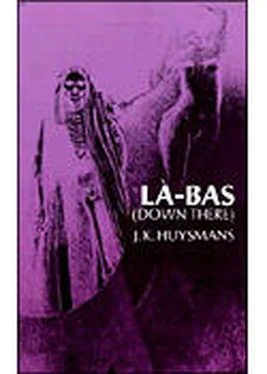Joris-Karl Huysmans - Down There (Là-Bas)
Здесь есть возможность читать онлайн «Joris-Karl Huysmans - Down There (Là-Bas)» весь текст электронной книги совершенно бесплатно (целиком полную версию без сокращений). В некоторых случаях можно слушать аудио, скачать через торрент в формате fb2 и присутствует краткое содержание. Жанр: Классическая проза, на английском языке. Описание произведения, (предисловие) а так же отзывы посетителей доступны на портале библиотеки ЛибКат.
- Название:Down There (Là-Bas)
- Автор:
- Жанр:
- Год:неизвестен
- ISBN:нет данных
- Рейтинг книги:3 / 5. Голосов: 1
-
Избранное:Добавить в избранное
- Отзывы:
-
Ваша оценка:
- 60
- 1
- 2
- 3
- 4
- 5
Down There (Là-Bas): краткое содержание, описание и аннотация
Предлагаем к чтению аннотацию, описание, краткое содержание или предисловие (зависит от того, что написал сам автор книги «Down There (Là-Bas)»). Если вы не нашли необходимую информацию о книге — напишите в комментариях, мы постараемся отыскать её.
Down There (Là-Bas) — читать онлайн бесплатно полную книгу (весь текст) целиком
Ниже представлен текст книги, разбитый по страницам. Система сохранения места последней прочитанной страницы, позволяет с удобством читать онлайн бесплатно книгу «Down There (Là-Bas)», без необходимости каждый раз заново искать на чём Вы остановились. Поставьте закладку, и сможете в любой момент перейти на страницу, на которой закончили чтение.
Интервал:
Закладка:
Of disappointment, first, for his unknown pleased him better. Mme. Chantelouve would never realize the ideal he had fashioned for himself, the tantalizing features, the agile, wild animal body, the melancholy and ardent bearing, which he had dreamed. Indeed, the mere fact of knowing the unknown rendered her less desirable, more vulgar. Accessibility killed the chimera.
At the same time he experienced a lively relief. He might have been dealing with a hideous old crone, and Hyacinthe, as he immediately began to call her, was desirable. Thirty-three at most, not pretty, but peculiar; blonde, slight and supple, with no hips, she seemed thin because she was small-boned. The face, mediocre, spoiled by too big a nose, but the lips incandescent, the teeth superb, her complexion ever so faint a rose in the slightly bluish milk white of rice water a little troubled.
Then her real charm, the really deceptive enigma of her, was in her eyes; ash-grey eyes which seemed uncertain, myopic, and which conveyed an expression of resigned boredom. At certain moments the pupils glowed like a gem of grey water and sparks of silver twinkled to the surface. By turns they were dolent, forsaken, languorous, and haughty. He remembered that those eyes had often brought his heart into his throat!
In spite of circumstantial evidence, he reflected that those impassioned letters did not correspond in any way to this woman in the flesh. Never was woman more controlled, more adept in the lies of good breeding. He remembered the Chantelouve at-homes. She seemed attentive, made no contribution to the conversation, played the hostess smiling, without animation. It was a kind of case of dual personality. In one visible phase a society woman, prudent and reserved, in another concealed phase a wild romantic, mad with passion, hysterical of body, nymphomaniac of soul. It hardly seemed probable.
"No," he said, "I am on the wrong track. It's merely by chance that Mme. Chantelouve spoke of my books to Des Hermies, and I mustn't jump to the conclusion that she is smitten with me and that she has been writing me these hot letters. It isn't she, but who on earth is it?"
He continued to revolve the question, without coming any nearer a solution. Again he called before his eyes the image of this woman, and admitted that she was really potently seductive, with a fresh, girlish body, flexible, and without a lot of repugnant flesh-and mysterious, with her concentrated air, her plaintive eyes, and even her coldness, real or feigned.
He summarized all that he really knew about her: simply that she was a widow when she married Chantelouve, that she had no children, that her first husband, a manufacturer of chasubles, had, for unknown reasons, committed suicide. That was all. On the other hand, too, too much was known about Chantelouve!
Author of a history of Poland and the cabinets of the north; of a history of Boniface VIII and his times; a life of the blessed Jeanne de Valois, founder of the Annonciade; a biography of the Venerable Mother Anne de Xaintonge, teacher of the Company of Saint Ursula; and other books of the same kind, published by Lecoffre, Palmé, Poussielgue, in the inevitable shagreen or sheep bindings stamped with dendriform patterns: Chantelouve was preparing his candidacy for the Académie des Inscriptions et Belles-Lettres, and hoped for the support of the party of the Ducs. That was why he received influential hypocrites, provincial Tartufes, and priests every week. He doubtless had to drive himself to do this, because in spite of his slinking slyness he was jovial and enjoyed a joke. On the other hand, he aspired to figure in the literature that counts at Paris, and he expended a good deal of ingenuity inveigling men of letters to his house on another evening every week, to make them his aides, or at least keep them from openly attacking him, so soon as his candidacy-an entirely clerical affair-should be announced. It was probably to attract and placate his adversaries that he had contrived these baroque gatherings to which, out of curiosity as a matter of fact, the most utterly different kinds of people came.
He had other motives. It was said that he had no scruples about exploiting his social acquaintances. Durtal had even noticed that at each of the dinners given by Chantelouve a well-dressed stranger was present, and the rumour went about that this guest was a wealthy provincial to whom men of letters were exhibited like a wax-work collection, and from whom, before or afterward, important sums were borrowed.
"It is undeniable that the Chantelouves have no income and that they live in style. Catholic publishing houses and magazines pay even worse than the secular, so in spite of his established reputation in the clerical world, Chantelouve cannot possibly maintain such a standard of living on his royalties.
"There simply is no telling what these people are up to. That this woman's home life is unhappy, and that she does not love the sneaky sacristan to whom she is married, is quite possible, but what is her real rôle in that household? Is she accessory to Chantelouve's pecuniary dodges? If that is the case I don't see why she should pick on me. If she is in connivance with her husband, she certainly ought to have sense enough to seek an influential or wealthy lover, and she is perfectly aware that I fulfil neither the one nor the other condition. Chantelouve knows very well that I am incapable of paying for her gowns and thus contributing to the upkeep of their establishment. I make about three thousand livres, and I can hardly contrive to keep myself going.
"So that is not her game. I don't know that I want to have anything to do with their kind of people," he concluded, somewhat chilled by these reflections. "But I am a big fool. What I know about them proves that my unknown beloved is not Chantelouve's wife, and, all things considered, I am glad she isn't."
CHAPTER VIII
Next day his ferment had subsided. The unknown never left him, but she kept her distance. Her less certain features were effaced in mist, her fascination became feebler, and she no longer was his sole preoccupation.
The idea, suddenly formed on a word of Des Hermies, that the unknown must be Chantelouve's wife, had, in fashion, checked his fever. If it was she-and his contrary conclusions of the evening before seemed hardly valid when he took up one by one the arguments by which he had arrived at them-then her reasons for wanting him were obscure, dangerous, and he was on his guard, no longer letting himself go in complete self-abandon.
And yet, there was another phenomenon taking place within him. He had never paid any especial attention to Hyacinthe Chantelouve, he had never been in love with her. She interested him by the mystery of her person and her life, but outside her drawing-room he had never given her a thought. Now ruminating about her he began almost to desire her.
Suddenly she benefited by the face of the unknown, for when Durtal evoked her she came confused to his sight, her physiognomy mingled with that which he had visualized when the first letters came.
Though the sneaking scoundrelism of her husband displeased him, he did not think her the less attractive, but his desires were no longer beyond control. In spite of the distrust which she aroused, she might be an interesting mistress, making up for her barefaced vices by her good grace, but she was no longer the non-existent, the chimera raised in a moment of uncertainty.
On the other hand, if his conjectures were false, if it was not Mme. Chantelouve who had written the letters, then the other, the unknown, lost a little of her subtlety by the mere fact that she could be incarnated in a creature whom he knew. Still remote, she became less so; then her beauty deteriorated, because, in turn, she took on certain features of Mme. Chantelouve, and if the latter had profited, the former, on the contrary, lost by the confusion which Durtal had established.
Читать дальшеИнтервал:
Закладка:
Похожие книги на «Down There (Là-Bas)»
Представляем Вашему вниманию похожие книги на «Down There (Là-Bas)» списком для выбора. Мы отобрали схожую по названию и смыслу литературу в надежде предоставить читателям больше вариантов отыскать новые, интересные, ещё непрочитанные произведения.
Обсуждение, отзывы о книге «Down There (Là-Bas)» и просто собственные мнения читателей. Оставьте ваши комментарии, напишите, что Вы думаете о произведении, его смысле или главных героях. Укажите что конкретно понравилось, а что нет, и почему Вы так считаете.












